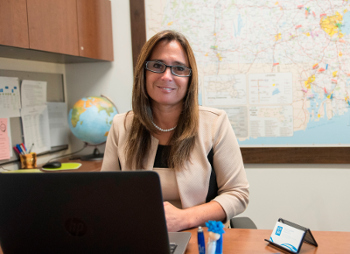Do you have a question about JRI services?
Attachment principles stretch from infancy to old age, from safety to exploration of self and other, with affective and reflective functioning, involving the processes of co-regulating affect and co-creating meanings. A resulting attachment-focused treatment--Dyadic Developmental Psychotherapy (DDP) is experiential and reflective and involves establishing attuned states between the young person and the therapist and caregiver in order to safely explore past traumas and current behaviors involving both fear and shame. The treatment involves assisting the young person to develop a coherent story involving both past abusive experiences and current experiences in a safe family. This story-telling stance is characterized by playfulness, acceptance, curiosity, and empathy. Strengths and vulnerabilities, reciprocity and conflicts are all understood and accepted. Dialogues emerge that fully accept the subjective experience of each participant in the conversation. Such dialogues become templates for satisfying and productive dialogues in all areas of life.
Principles and strategies of both psychological treatment and daily care which utilize our understanding of both attachment and trauma will be presented and discussed. This model of intervention will be demonstrated with videos of treatment sessions.
Morning
First:
Secure and Insecure Attachment
Multiple Symptoms of Developmental Trauma
Attachment Security, Intersubjectivity, and their developmental effects
Second:
Principles of Dyadic Developmental Psychotherapy for Young People and their Caregivers
Intersubjective Presence: attunement, joint attention and intentions.
Conversations and Stories
PACE: Playfulness, acceptance, curiosity, and empathy.
Lunch
Afternoon
Third:
Principles and Interventions of Dyadic Developmental Psychotherapy
Two phases of Treatment:
A. Caregivers seen alone
B. Caregiver and Young Person seen together
Focusing under the symptoms
Follow-Lead-Follow
Affective/Reflective Dialogue
Speaking for/Speaking about
Interactive Repair
Fourth:
Caregiving Principles and Interventions
Exploring the Caregiver’s parenting and attachment histories
Blocked Care
Day-to-Day Care
Learning Objectives:
This workshop is designed to
1. Understand the effects of developmental trauma, reactive attachment disorder and attachment disorganization.
2. Understand the developmental effects of a secure attachment and trauma
3. Understand the basic principles of Dyadic Developmental Psychotherapy
4. Understand the basic interventions of Dyadic Developmental Psychotherapy
5. Understand the basic principles of caregiving for developing attachment security
6. Understand characteristics of day-to-day care



